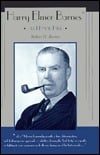“Harry’s gone mad,” yelled Mrs. Barnes. “I just saw him running around the side of the house with a gun, muttering something about the plumbers.” Young Robert ran outside, and there found his dad, distinguished historian and man of letters, lying on his belly, blasting away with his old Army rifle at the foundation of their house. “The g-damn plumbers have been chipping away at this wall for two days,” explained Harry, “A hundred rounds of this will take care of it before the bastards bankrupt me!” Robert Barnes’s delightful reminiscence of his father reminds us of a time when real men still existed. Whether arguing, drinking, hunting, or cussing, Harry Elmer Barnes lived life with a gusto that is rare and rarely acceptable today. He inherited from the pietism of his parents and from the austere rural region of Upstate New York, where he was born in 1889 and raised on a farm, both a faith in the virtues of hard work and honesty and a short tolerance for anyone lacking the same. Not unlike his good friend H.L. Mencken, he was master of the bon mot who took pride in the force and ingenuity of his invective. His comment about one of Robert’s girlfriends—”She has all the beauty, charm and erudition of a 10- month-old heifer”—was characteristic of him, both as a father and as leader of the historiographical school known as Revisionism. From World War I to the Tet Offensive, no American scholar spoke more honestly about, and fought more tirelessly against, American globalism in its various guises—whether as a war against communism, a crusade for human rights, or a rendezvous with destiny—than Harry Barnes. The terse titles of his essays and catchphrases from his prose—Perpetual War for Perpetual Peace, the “Court Historians,” the “Blackout Boys,” the “Smearbund”—remind us how old political correctness really is in this country and how difficult it has always been to speak truth to power. He taught at Harvard, Columbia, and a half-dozen other schools; was one of the chief editorialists for the Scripps- Howard newspaper chain; and left behind some 40 volumes of scholarship and cultural comment. Barnes died in 1968 at the age of 80, dropping dead in mid-sentence as he rose from table and offered his guests a caustic toast to the new Republican candidate for President. “To Richard Milhous Nixon, may the son-“
[Harry Elmer Barnes As I Knew Him, by Robert II. Barnes (Worland, Wyoming: High Plains Publishing Company, Inc.), 129 pp., $19.50]

Leave a Reply